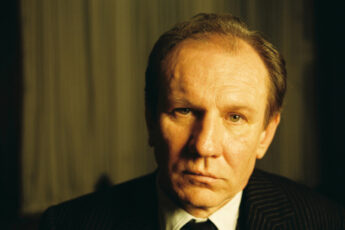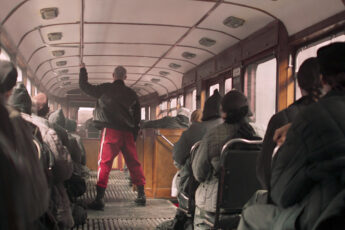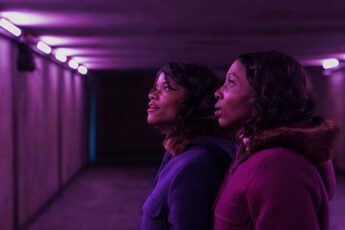Everything and Nothing. Sometimes Without Sense.
Tomasz Wasilewski’s Fools (Głupcy, 2022)
Vol. 125 (May 2022) by Jack Page
Marlena and Tomek’s idyllic coastal life is abruptly halted when they take it upon themselves to look after their dying son Mikołaj. Mikołaj is a quadriplegic patient and requires constant care and attention. The dynamic of Marlena and Tomek’s relationship is soon tested, and their once romantic kinship is shattered by the brunt of Mikołaj’s dispiriting presence in their home. The reluctant caregiving couple will need to sacrifice many comforts and – to a graver extent – each other in order to help their sickly son.
The salacious opening sequence of Wasilewski’s fourth feature film depicts the protagonists in the throes of passion. The medium shot’s tight framing and pull focus only accentuate the zestfulness of their mingling body parts. Lustful groans are a pleasurable audible feature here (but will later manifest itself in a hellish, inescapable sound during the third act). The partners’ intimacy is a contented one, in which their gestures and performance portray the knowingness of long-term lovers. What they lack in spark, they make up for in the comfortability of each other’s bodies. It is a sex scene that intentionally plays on the absence of titillation and the pornographic. The static camera echoes the limited mobility of Tomek and Marlena as he caresses her exposed breasts and they squirm upon the bedsheets in a mess of sweaty, shimmering skin. Their heavy breathing is interrupted by a buzzing mobile phone and the act is soon cut short. The call – which is later revealed to be relating to Mikołaj – is a foreshadowing of every interference and loss that is to come for Marlena and Tomek.
As the film progresses, a growing tension is paralleled with the increasing weight of responsibility required to care for Mikołaj’s condition. Marlena’s professional experience as a nurse in a maternity ward can only prepare her for so much. It takes five individuals to carry her full-grown son up the stairway, instilling a sense of claustrophobia which is further heightened when Mikołaj’s hospital bed is installed in their home. Marlena and Tomek’s domestic interiors become cramped as they swivel the bed in order to give their son a pathetic welcome tour of the house. Mikołaj’s death rattle constantly rings throughout the apartment. When Tomek leaves in frustration, his cries become wilder, screeching like a banshee. His painful wailing proves inescapable as Marlena tries to find a peaceful respite on the beach, where she is met with the incessant honking of seagulls and the barking of seals. The noise takes its toll, to the point she herself howls in agony. The deafening silence of the next scene offers the audience some auditory relief but signals Mikołaj’s tragic death. Yet, the impact of events on his family lingers even after his passing. The lasting psychological trauma is aptly expressed in Marlena and Tomek’s car ride after the funeral. The never-ending tire tracks in the sand seem to visualize their unremitting internal struggle as they embark on their journey of grief. The vehicle drifts aimlessly and forever in the darkness as they bicker, stuck in the headlight’s perpetual beams of gloominess.
Wasilewski’s directing style has never felt more assured. The filmmaker confidently pushes the boundaries of narrative forms, in this instance opting for more abstract methods of imagery and stylistic representation. In one memorable mise-en-scène, Marlena stands barefooted by the open front door. The rolling ocean waves in the background are angled at a point where they seem to approach the inside of the hallway. The black water is illuminated by a dimming moon as the wind blows Marlena’s costume behind her. It is a surreal shot, one that envisages her isolation and fear of the unknown. The danger or threat to her happy existence is literally on her doorstep and – if interpreted metaphorically – could also be read as her son’s homecoming on the horizon. This nautically themed aesthetic is employed throughout Fools. In the hospice where Mikołaj is monitored, one of the corridors is blocked by a wall of barnacles and seaweed. At one point, seagulls fill the living room of Marlena and Tomek’s apartment and snow is piled high against the hospital ward windows. Even the wallpapered interiors of their flat have connotations of the sea: green palm trees, blue wave patterns, shell shapes and sandy textures. The constant impression of the coast that once offered a peaceful freedom for the protagonists now swamps and suffocates their daily routine, as if the setting is closing in on them.
Fools is a disturbing tale and frighteningly unpredictable. The film’s tone creeps unexpectedly over the viewer, as its woeful characters are equally pedestrian and impulsive. Their emotions flip from eccentric to pugnacious at times of crisis, causing huge rifts in their relationships to one another. Their breakdowns in communication lead to obscene outbursts of hysteria, some of which are inexcusable. However, there is something liberating about these absurd confrontations, and I believe Wasilewski makes a point by the film’s conclusion to suggest Marlena’s newfound emancipation and bravery have stemmed from the acceptance and death of her son. In the final sequence of the film, as if to numb the pain of her ordeal, the once hesitant and fearful Marlena wades into the freezing and ferocious open water of the ocean.




Leave a Comment